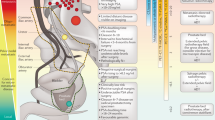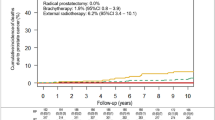Abstract
Although the number of men with lymph node-positive prostate cancer has declined, it is still significant and the challenge remains on how best to treat these patients. Only long-term follow-up can give a true indication of the outcome in prostate cancer. We evaluated our experience in treating lymph node-positive prostate cancer with a median follow-up of 10.2 years. The overall 5-year survival was 78% and the 10-year survival was 56%. Length of tumor control depends on the type of treatment given. Adding androgen ablation improves the duration of control dramatically, although optimal timing is still uncertain.
This is a preview of subscription content, access via your institution
Access options
Subscribe to this journal
Receive 4 print issues and online access
$259.00 per year
only $64.75 per issue
Buy this article
- Purchase on Springer Link
- Instant access to full article PDF
Prices may be subject to local taxes which are calculated during checkout
Similar content being viewed by others
References
Swanson GP, Basler J, Thompson IM . Current status of lymph node positive prostate cancer: incidence and predictors of outcome. Cancer 2006; 107: 439–450.
Swanson GP, Basler J, Thompson IM . Treatment options in lymph node positive prostate cancer. Cancer 2006; 106: 2531–2539.
Steinberg GD, Epstein JI, Piantadosi S, Walsh PC . Management of stage D1 adenocarcinoma of the prostate: the John Hopkins experience 1974–1987. J Urol 1990; 144: 1425–1432.
Catalona WJ, Miller DR, Kavovssi LR . Intermediate term survival results in clinically understaged prostate cancer patients following radical prostatectomy. J Urol 1988; 140: 540.
Cheng CWS, Bergstralh EJ, Zincke H . Stage D1 prostate cancer. Cancer 1993; 71: 996–1004.
Grimm MO, Kamphausen S, Hugenschmidt H, Stephan-Odenthal M, Ackermann R, Vogeli TA . Clinical outcome of patients with lymph node positive prostate cancer after radical prostatectomy versus androgen ablation. Eur Urol 2002; 41: 628–634.
Cadeddu JA, Partin AW, Epstein JI, Walsh PC . Stage D1 (T1-3,N1-3,M0) prostate cancer: a case-controlled comparison of conservative treatment versus radical prostatectomy. Urology 1997; 50: 251.
Zincke H, Bergstralh EJ, Larson-Keller JJ, Farrow GM, Myers RP, Lieber MM et al. Stage D1 prostate cancer treated by radical prostatectomy and adjuvant hormonal treatment: evidence for favorable survival in patients with DNA diploid tumors. Cancer 1992; 70: 311.
Gervasi LA, Mata J, Easley JD, Wilbanks JH, Seale-Hawkins C, Carlton Jr CE et al. Prognostic significance of lymph node metastases in prostate cancer. J Urol 1989; 142: 332.
Lawton CA, Winter K, Byhardt R, Sause WT, Hanks GE, Russell AH et al. Androgen suppression plus radiation versus radiation alone for patients with D1 (pN+) adencarcinoma of the prostate (results based on a national prospective randomized trial, RTOG 85-31). Int J Radiat Oncol Biol Phys 1997; 38: 931.
Puthawala AA, Syed AM, Austin PA, Cherlow JM, Perley JM, Shanberg AM et al. Long term results of treatment for prostate carcinoma by staging pelvic lymph node dissection and definitive irradiation using low-dose rate temporary iridium-192 interstitial implant and external beam radiotherapy. Cancer 2001; 92: 2084–2094.
Schmid HP, Mihatsch MJ, Hering F, Rutishauser G . Impact of minimal lymph node prognosis after radical prostatectomy. Eur Urol 1997; 31: 11–16.
Zagars GK, Pollack A, Eschenbach AC . Addition of radiation therapy to androgen ablation improves outcome for subclinically node-positive prostate cancer. Urology 2001; 58: 233–239.
Aus G, Nordenskjold K, Robinson D, Rosell J, Varenhorst E . Prognostic factors and survival in node-positive (N1) prostate cancer – a prospective study based on data from a Swedish population-based cohort. Eur Urol 2003; 43: 627.
Schroeder FH, Kurth KH, Fossa SD, Hoekstra W, Karthaus PP, Debois M et al. Early versus delayed endocrine treatment in pN1-3 M0 prostate cancer without local treatment of the primary tumor – results of EORTC 30846 – a phase II study. J Urol 2004; 172: 923–927.
Messing EM, Manola J, Sarosdy M, Wilding G, Crawford ED, Trump D . Immediate hormonal therapy compared with observation after radical prostatectomy and pelvic lymphadenectomy in men with node-positive prostate cancer. J Urol 2003; 169: 396, abstract no. 1480.
Da Pozzo LF, Cozzarini C, Bertini R, Colombo R, Mazzoccoli B, Roscigno M et al. Radical prostatectomy for node-positive prostate cancer: impact of adjuvant hormonal therapy and radiotherapy. J Urol 2003; 169: 494, abstract no. 1850.
Kramolowsky EV . The value of testosterone deprivation in stage D1 carcinoma of the prostate. J Urol 1988; 139: 1242–1244.
Keating NL, O'Malley AJ, Smith MR . Diabetes and cardiovascular disease during androgen deprivation therapy for prostate cancer. J Clin Oncol 2006; 24: 4448–4456.
Kumar RJ, Barqawi A, Crawford ED . Preventing and treating the complications of hormone therapy. Curr Urol Rep 2005; 6: 217–223.
Author information
Authors and Affiliations
Corresponding author
Rights and permissions
About this article
Cite this article
Swanson, G., Riggs, M. & Herman, M. Long-term outcome for lymph node-positive prostate cancer. Prostate Cancer Prostatic Dis 11, 198–202 (2008). https://doi.org/10.1038/sj.pcan.4500983
Received:
Revised:
Accepted:
Published:
Issue Date:
DOI: https://doi.org/10.1038/sj.pcan.4500983



